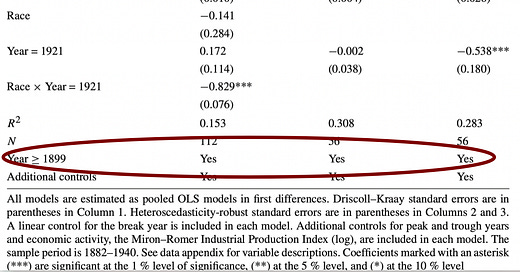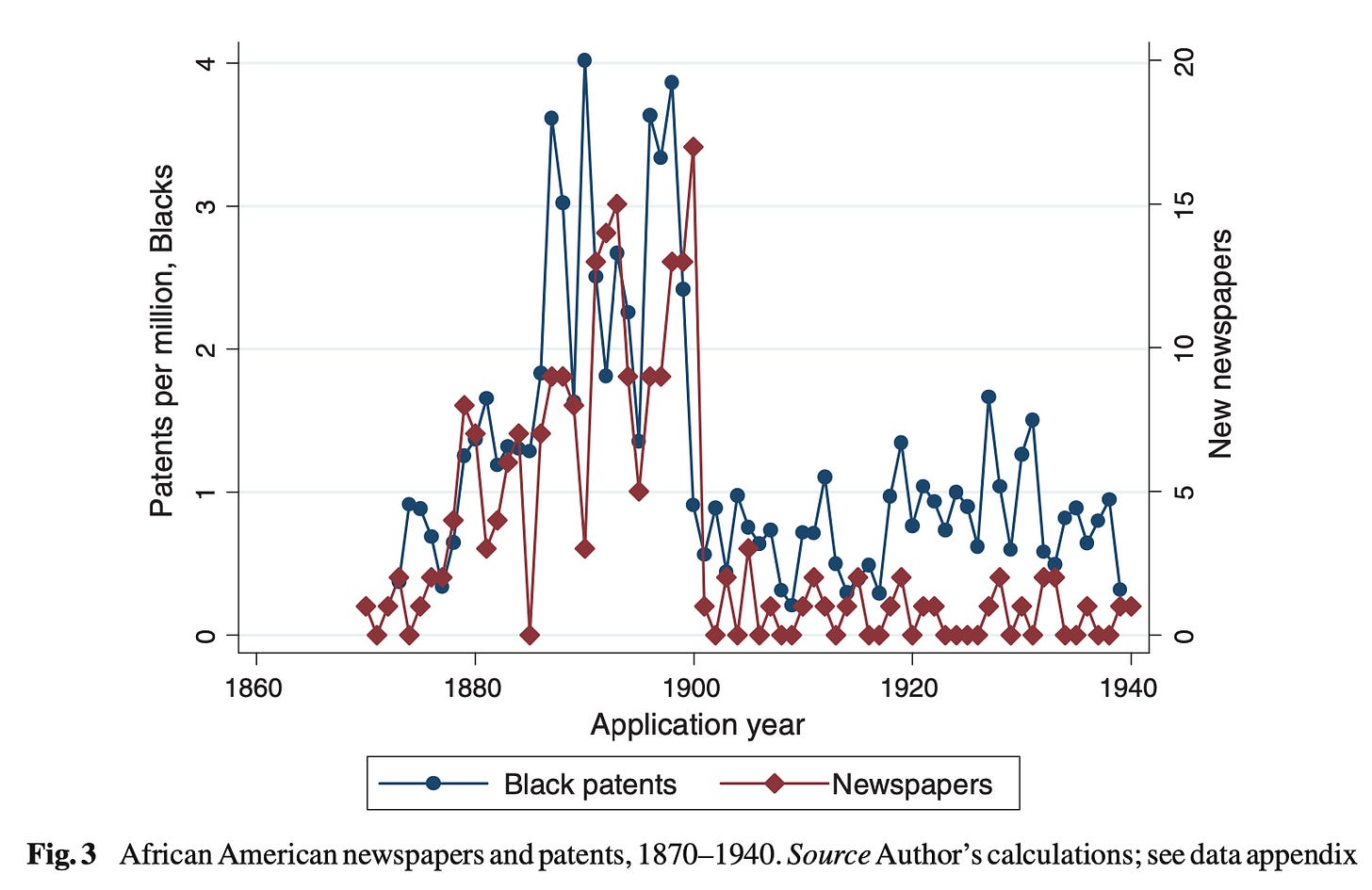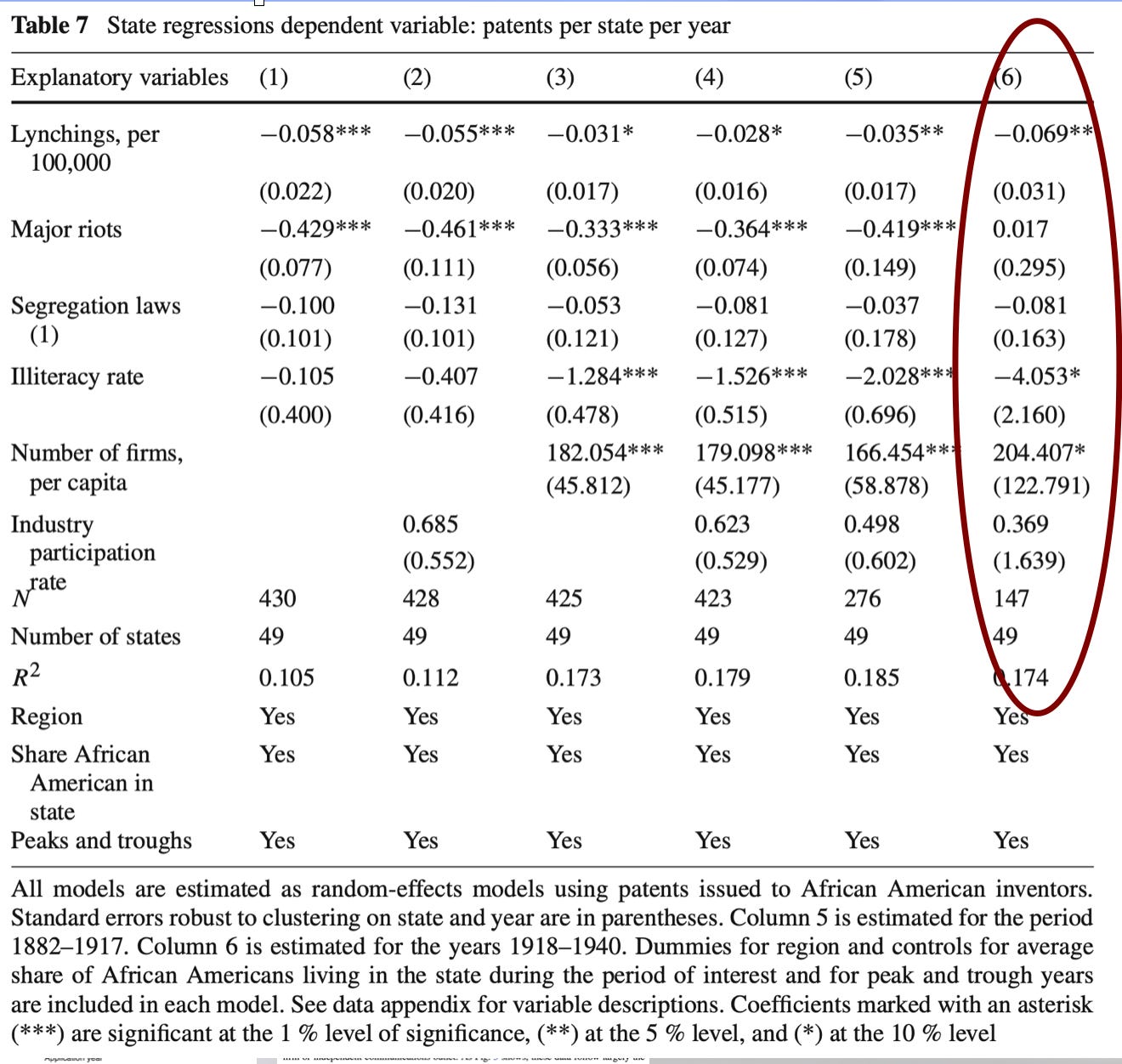Have Harald Uhlig & Company Read Lisa Cook’s Paper at All? Answer: No
& BRIEFLY NOTED: FOR 2022-02-15 Tu
First: Question: Have Harald Uhlig & Company Read Lisa Cook’s Paper at All? Answer: No
Only somebody who has not read the paper, and does not care that they have not read the paper, would say so.
So last Wednesday I was peacefully working away, reached the end of one task, filed it away, decided to check to see if any emails I needed to deal with had come in over the past eight hours, and found:
Chris Brunet <chrisbrunet@xxxxxxxxxxxxxxxxxxxxxxxxx.org>: I saw you signed this letter: <https://www.banking.senate.gov/imo/media/doc/NEA%20support%20statement%20signatories%20in%20columns[1].pdf>. I am trying to find one person among the 500 of you who is brave enough to respond to this blog post: <https://haralduhlig.blogspot.com/2022/02/lisa-cook-has-been-nominated-to-federal.html>
More specifically, I am looking for a comment on whether or not you think Cook's signature publication, "Violence and economic activity: evidence from African-American patents, 1870-1940", is fatally flawed as Uhlig suggests. Do you agree with Uhlig's assessment of this paper? Is this paper fatally flawed? Why or why not? You have 24 hours to respond.
So I wrote back, immediately: I’ve engaged with Harald before, and found it a waste of time. He’s not a data person… When Lisa came to Berkeley to present this, we gave her a hard time on the data point, and she convinced us that it was a real discontinuity in patenting, and not simply a failure to identify patents by Blacks. People who had been patenting in the 1890s, and ought to have been patenting in the 1900s, weren't, IIRC...
Chris Brunet: Huh. When I hear that people who had been patenting in the 1890s, and ought to have been patenting in the 1900s, weren't, My first instinct is to think "they must have stopped harvesting data on those people", not, "Oh, those people must have become less innovative and stopped wanting to patent"
So I wrote back again: Her problem was not in finding patents patents are indexed by name Dash — figuring out which names are those of African-American inventors. Once you find an inventor, you can track his patents throughout his career whether or not they ended up in Baker’s sample. That said, my view was it is that some of the circa 1900 decline is very likely to be a coverage issue. But data work is very hard, and sniping at data imperfections is very easy. My rule-of-thumb has always been that it is those people who put in the work to try to make better data have standing to criticize past efforts at data work — thus Christina Romer got her standing to criticize Stan Lebergott. That rule of thumb has kept me from wasting a lot of time.
You know, if someone were brought to you, and you were told that they had been deputy team lead for financial regulation and such issues during a presidential transition, had been the point staff economist for the White House on the Eurozone dimension of the 2008 to 2012 financial crisis, had been a special advisor to the secretary of the treasury on finance and development, and had been a Hoover Institution National Fellow, your reaction would not have been “this is an unqualified person put forward to advance some sinister non-technocratic agenda”, let alone someone put forward because she strokes the “erogenous zones of progressives”.
I confess I did not think we would get to calling Lisa Cook a whore in the first week of this.
Chris Brunet: I admit I had never heard of George Will before, since I am Canadian, and can only keep track of so many pundits. I have no strong opinions on his "erogenous zones" analogy.
At this point, I decided that I had spent enough time wading in this particular pool of muck—somebody who claims to have never heard of George F. Will and to have no opinion about whether one should or should not—genteely, for George F. Will learned at Bill Buckley’s knee how to do this, so that he can pretend that was not what he meant, while leaving no real doubt in anyone’s mind that that was what he meant—call a Black woman a whore is just not worth engaging.
But I did file this away, thinking that I really should reread Lisa Cook (2014) <http://econ.msu.edu/papers/cook/Violence%20and%20Economic%20Activity.pdf>, and last night I did so:
I had failed to bring to mind that her responses to the data questions were not just that “there is a break not just in the aggregate series but in individual inventors’ patenting patterns around 1900”, but that also there was a broader sharp fall in entrepreneurial activity by African-Americans: newspapers, for example. After checking, other people at the seminar I saw say that they thought this figure did the most in putting to rest fears that all of the ca.-1900 decline was a data artifact. If it is all a data artifact, it is a very broad one:
I had failed to bring to mind that her first—her very first—set of regression results, in Table 6, dummies out the pre-1900 data—the computer is looking for patterns in the 20th century and patterns in the 19th century, and is paying no attention to the sharp drop at the century boundary:
Her second, panel, set of regression results in Table 7 does, for the most part, use the ca.-1900 decline as part of its identifying variance. But column 6, which looks only at the 1918-1940 sample, does not. It looks as though the computer does take the time-series dimension of the absence of riots and the boom in inventive activity from 1880-1895 as its signal that white violence in the form of race-riots is substantially correlated with low patenting, but even in the post-WWI sample there is plenty of cross-sectional state identifying variation for the computer to judge that places where there are a lot of lynchings are places where it is very unhealthy to be a Black inventor as well:
My conclusion?
I do not think Harald Uhlig has read Lisa Cook’s paper at all.
If you read the paper, you noticed that Table 6 and column 6 of Table 7 did not rest at all on the apparent sharp decline in African-American patenting in 1900. That possible data discontinuity is not a “fatal flaw”. Nobody who had read the paper would call it such.
It’s an issue with the series, and a factor to be worried about in evaluating columns (1)-(5) of Table 7. But, then, in good papers there are always data issues.
But “fatal flaw'“? Only somebody who has not read the paper, and does not care that they have not read the paper, would say so.
One Video:
Asianometry: How Japan Won Lithography <https://www.youtube.com/watch?v=rjQMcWqLJug>:
One Picture:
The woman in the center—Mnesarete of Thespiai, the favored model for Aphrodite in Athens in the age of Aristotle—is, in the historical record, nicknamed “Phryne”, “Toad”, for her attractive yellowish-brown skin, so unlike the corpse-like pallor of Thracian or Gaulish barbarians from the north:
19th-century whitewashing, much?
Very Briefly Noted:
Irin Carmon: What’s Actually in the Harvard Sexual Harassment Complaint Against Harvard’s John Comaroff <https://nymag.com/intelligencer/2022/02/whats-actually-in-the-harvard-sexual-harassment-complaint.html>
Kate Riga: In Alabama Case, Kavanaugh Emits Lengthy Whine In Response To Kagan’s Dissent<https://talkingpointsmemo.com/news/alabama-supreme-court-kavanaugh-kagan-alabama-redistricting>
Mark Borello & David Sepkoski: Ideology as Biology: ‘E. O. Wilson… correspondence with… J. Philippe Rushton… <https://www.nybooks.com/daily/2022/02/05/ideology-as-biology/>
Max Weber: Science as a Vocation <https://www.soc.upenn.edu/sites/default/files/Weber-Science-as-a-Vocation.pdf>
Katie Martin: The ‘Zuck Shock’ Is a Cautionary Tale for Equities: ’Big Tech’s dominance leaves investors heavily exposed to risk of a company stumbling as market froth recedes… <https://www.ft.com/content/6ad7b79e-e606-4daa-baa3-9bf219aad3cf>
Barry Ritholtz & Rebecca Patterson: Transcript <https://ritholtz.com/2022/02/transcript-rebecca-patterson/>
Matthew Yglesias: Let’s Build Back Better…
Arys: ’An incredible artifact… This device, consisting of a sundial and geared mechanical calendar, is the second oldest known of its kind. The earliest known example is the #AntikytheraMechanism. It dates around 400–600 Byzantine Empire…


Paragraphs:
Katharine Abraham & al.: Fed Nominees Letter: ‘We… urge you, for the growth and stability of our economy, to swiftly confirm President Biden’s nominees for the Federal Reserve System Board of Governors. While we do not all agree on monetary policy or how the Federal Reserve should respond to the current economic environment, we believe that all five currently pending nominees—Jerome Powell (Chair), Lael Brainard (Vice Chair), Sarah Bloom-Raskin (Vice Chair for Supervision), Lisa Cook, and Philip Jefferson—are highly qualified to serve and would bring a critical set of perspectives and skills to the job…
Ezra Klein: Can Democrats See What’s Coming?: ‘Picking winners and losers means picking some losers. Venture capitalists can brag about their failures, but bureaucrats are flayed for them. That the Obama administration funded Solyndra is canon. That the same program threw a lifeline to a struggling electric car manufacturer named Tesla is trivia. Democrats have run scared from accusations of big government for decades, and so they continue to try to show that they will leave the market to its magic, the scientists to their beakers, and confine government to cushioning the blows or looking after the children…. Biden… promised a “wartime effort” to fight Covid, but that’s not what we’ve seen…. But if Democrats don’t always admit how much government can do to help, they also don’t always admit how much it can do to hurt. The market would build more housing if local zoning czars would let them. Companies were clamoring to sell more rapid tests earlier, but the F.D.A. wouldn’t let them. All across the country, nuclear and solar and wind projects are being tied up in red tape…. If Democrats want to claim a bigger role for government in shaping our future, they need to be the ones who are most outraged when it is government that is holding us back…
LINK: <https://www.nytimes.com/2022/02/12/opinion/yellen-supply-side-liberalism.html>
Duncan Black: “Last Vestiges”: ‘Our coverage is all wrong, but we can’t be faulted for discounting the 57% who are in a cargo cult: Sam Stein: “A notable poll number that may be capturing the last vestiges of the pro mask sentiment but maybe also shows that the online discourse is not totally connected to the larger discourse” [parents polled on school masks: 57% required, 36% optional, 7% not allowed]…
LINK: <https://www.eschatonblog.com/2022/02/last-vestiges.html>
Jan-Peter Kleinhans & Julia Hess: Understanding the Global Chip Shortages: ‘The global semiconductor value chain… is highly efficient and innovative but prone to be disrupted by external shocks, and it does not adapt well to skyrocketing demand due to diverging long-term business interests of fabs and their customers. This is nothing new to the semiconductor market; in fact, this is neither the first nor the last boom-and-bust cycle…. Any supply chain that depends on chips, such as the automotive supply chain, will also need to invest in substantial inventory on their own and better supplier relationships…
LINK: <https://www.stiftung-nv.de/sites/default/files/understanding_the_global_chip_shortages.pdf>
Evie Liu: 4 Lessons from ARK’s Rapid Rise—and Fall: ‘Outspoken… Cathie Wood was the biggest success story of 2020. Last year, however, was a very different story. ARK Innovation… is down 52% from the peak…. Funds that shoot up considerably in a short period of time are typically making very concentrated bets, which means their downfall could be similarly dramatic…. Investors’ actual returns (known as dollar-weighted returns) are often worse than the stated returns of the fund itself, because investors tend to go in after many gains have been made and get out too late… LINK: <https://www.barrons.com/articles/cathie-wood-ark-fund-rapid-rise-fall-51643763966>
Benji Jones: How Migratory Birds Use Earth’s Magnetic Field: ‘The mysteries of magnetic perception in birds have intrigued scientists for decades. Now we have some fresh clues into this astonishing ability. A new study in the journal Science suggests that Eurasian reed warblers — and likely other migratory songbirds — sense a specific aspect of Earth’s magnetic field, called the angle of inclination, to know where to roost on their journey north. It functions as a kind of magnetic address or “stop sign,” the researchers write, that tells the birds when they’ve arrived…
LINK: <https://www.vox.com/down-to-earth/22901324/birds-migration-navigation-earth-magnetic-field>










"EROGENOUS ZONES" is a typical right-wing commnet --calling attention to the fact that left-wingers have biological functions.. Somehow it is meant to embarrass--It doesn't add anything toi the discussion. Allen Kamp
Thanks for posting that Kleinhans & Hess paper, very informative.